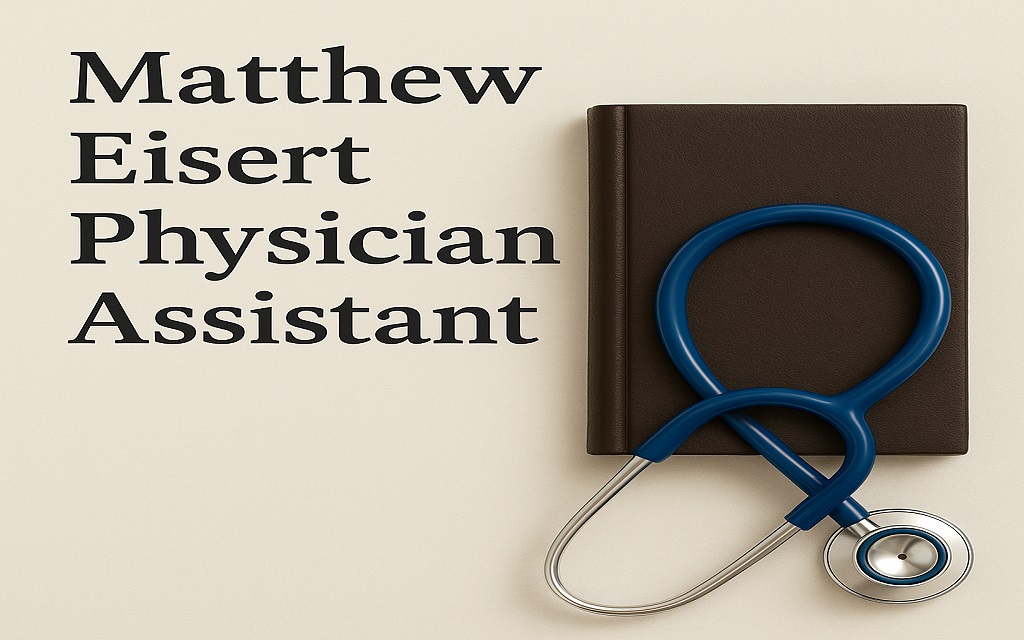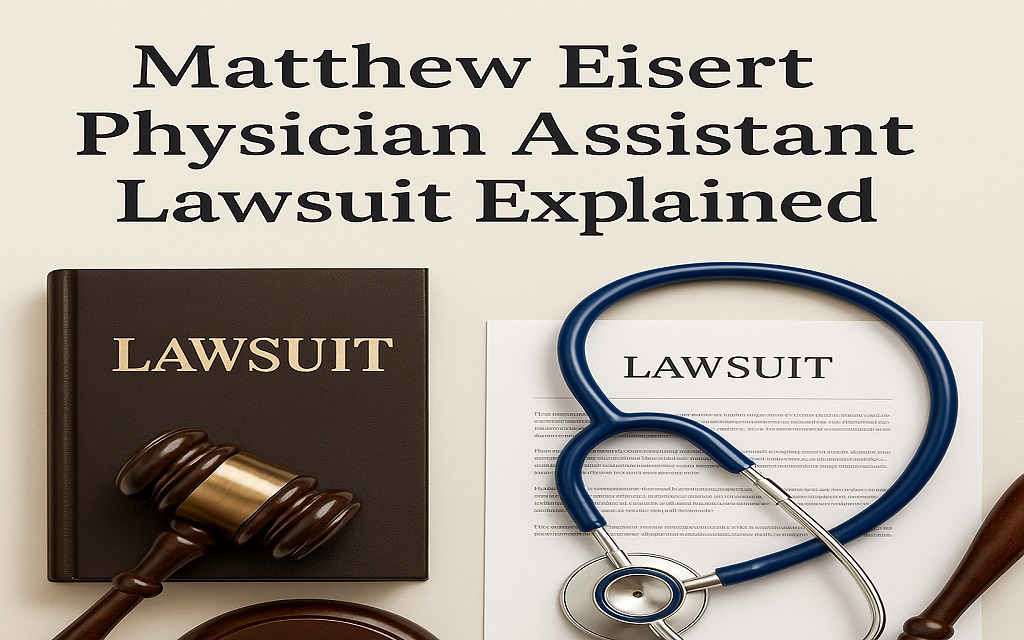You should understand the core events before the Matthew Eisert Physician Assistant Lawsuit. A physician assistant, Matthew Eisert, faced legal action over medical negligence claims—allegations involved improper conduct during patient care. Authorities launched investigations into potential ethical and legal violations.
It is essential to know that licensed physician assistants must follow strict guidelines. Any deviation can trigger regulatory review. Court documents pointed to serious concerns, including protocol violations, insufficient patient monitoring, and lack of oversight.
According to Health. US News, the lawsuit raised essential questions, centered on the scope of authority and responsibility under physician supervision. Healthcare ethics experts acknowledged the significance of the case.
A 2023 Medscape report noted that over 12% of physician assistants reported legal threats during their careers. This statistic highlights rising accountability across the profession.
What Are the Legal Claims Against Matthew Eisert?

You should look closely at the accusations. Plaintiffs alleged that Eisert failed to meet professional standards. Claims outlined a pattern of missteps that compromised patient safety.
Key legal points involved:
- Violation of state medical protocols
- Absence of necessary documentation
- Failure to consult supervising physicians
- Risk exposure to patients due to negligent care
Each point became part of the court proceedings. Legal analysts emphasized the importance of role boundaries. You should know that state medical boards strictly regulate physician assistant conduct.
Understanding that noncompliance can result in severe consequences, including license suspension or permanent removal from practice is crucial.
How Does Supervision Law Apply to Physician Assistants?
You must consider the legal framework. Physician assistants operate under mandatory supervision, and state laws require direct or delegated authority from licensed doctors.
Eisert’s case focused attention on breakdowns in this structure. Reports indicated unclear communication with supervising staff. The court examined chain-of-command records and treatment history.
A 2021 report by the National Commission on Certification of Physician Assistants stated that 81% of PAs work under formal collaboration agreements.
Failure to uphold these terms can lead to malpractice exposure. Supervision clauses in state statutes often define scope, review cycles, and consultation points. You should verify such agreements before engaging in independent clinical decisions.
What Ethical Principles Are Involved in This Case?
You must also examine the ethical side. Medical ethics demand transparency, patient consent, and accountability. Allegations in the Eisert lawsuit pointed to failures in ethical conduct.
You should note the following key ethical violations:
- Ignoring patient autonomy in decision-making
- Omitting critical information from patient files
- Breaching patient confidentiality standards
These concerns raised questions across medical boards. Ethical breaches may not always break the law, but damage professional trust. You should focus on moral education throughout your healthcare journey.
It is vital to understand that ethical violations trigger professional reviews. Medical ethics committees and licensing boards may open independent inquiries.
Why Do Lawsuits Against Physician Assistants Matter?
It is necessary to address the broader impact. Lawsuits influence healthcare policy, insurance premiums, and patient trust. Eisert’s case gained media coverage because of growing concern over PA liability.
Healthcare employers now focus more on risk management. You should expect tighter internal audits, mandatory reporting, and protocol reviews.
According to a 2022 study by the American Academy of PAs, malpractice premiums increased by 18% following legal action against mid-level providers.
Eisert’s lawsuit added to the pressure. Legislators proposed reforms in some states, including clearer definitions of physician assistants’ “scope of care.”
What Can You Learn From the Matthew Eisert Physician Assistant Lawsuit?
You should treat this case as a warning. It highlights the importance of protocol, communication, and compliance. Career success depends on strict alignment with rules and ethics.
Lessons include:
- Document every patient encounter thoroughly
- Confirm supervision requirements before each procedure
- Review legal updates from your state licensing board
- Attend continuing medical ethics courses
You should stay proactive. Avoid waiting for a legal notice before fixing compliance issues.
It is worth noting that legal defense often depends on documentation. Missing records can lead to presumed guilt or default judgments.
What Are the Legal Risks Physician Assistants Commonly Face?
You should stay informed about legal exposures. Most lawsuits against PAs arise from documentation gaps, lack of oversight, or boundary violations.
Common legal risks include:
- Unauthorized prescriptions or treatments
- Incomplete informed consent
- Lack of clear patient discharge instructions
- Omission of diagnosis explanations
Legal advisors recommend maintaining a malpractice insurance policy. You should always carry liability coverage, even under employer policies.
It is vital to consult risk managers in your workplace. They can help identify high-risk behaviors early.
How Should Physician Assistants Respond to Lawsuits?
You should act quickly. Legal action requires immediate documentation and legal counsel. Delay can increase exposure and damage credibility.
Important steps include:
- Contacting a medical defense attorney immediately
- Notifying your licensing board as required
- Reviewing all related patient charts
- Collecting communication logs and notes
Maintaining professionalism throughout legal proceedings is necessary. Courts evaluate demeanor and cooperation.
A 2020 survey from MedMalDirect found that 47% of PAs did not know the reporting requirements after a patient filed a complaint. This knowledge gap increases risk.
You should study legal responsibilities during your licensure and recertification cycles.
How Do State Medical Boards Handle Such Cases?
You must understand the role of licensing authorities. Boards investigate, discipline, and monitor PAs under their jurisdiction. Eisert’s case likely involved hearings and formal reviews.
Boards evaluate:
- Patient safety risks
- Professional conduct history
- Continuing education status
- Communication logs with supervising physicians
You should cooperate fully with any board inquiry. It is essential to maintain transparency and professionalism.
Board actions may include:
- Formal warnings
- Temporary suspension
- Mandatory training programs
- License revocation
You should maintain a clean record to avoid disciplinary marks.
What Preventive Measures Reduce Legal Exposure?
You should build strong habits. Prevention begins with awareness, routine reviews, and mentorship. Legal experts recommend active risk audits.
Preventive actions include:
- Updating treatment protocols annually
- Holding regular team reviews with supervisors
- Conducting mock audits of patient records
- Using checklists for informed consent and discharge
You should avoid shortcuts. Every patient interaction deserves full attention and compliance.
Risk Management Quarterly reports that documentation errors caused 60% of lawsuits in outpatient clinics.
Legal prevention demands teamwork. Administrators, physicians, and assistants must work in sync.
What Role Does the Media Play in Healthcare Lawsuits?
You should recognize the power of media coverage. Public perception affects licensing reviews and career paths. Eisert’s case appeared across legal blogs and healthcare forums.
Media can amplify details. Even minor claims may appear serious in public narratives.
You should never discuss cases publicly. Legal teams often recommend silence until court closure. Premature comments can breach confidentiality or misrepresent facts.
It is helpful to have a media policy in place. Your employer should guide communication during legal incidents.
What Should Future Physician Assistants Keep in Mind?
You must prepare early. New graduates often enter practice unaware of legal responsibilities. Legal literacy must match clinical competence.
Important reminders include:
- Reviewing malpractice policies before accepting job offers
- Joining PA associations for legal resources
- Attending annual legal compliance seminars
- Engaging in supervised practice rotations
You should also request feedback regularly. Supervisors can flag issues early before legal risks grow.
Medical education should include law, ethics, and documentation mastery. You should take time to study those areas thoroughly.
How Does the Matthew Eisert Lawsuit Influence Future Laws?
You should follow legislative updates. Eisert’s case raised questions across multiple jurisdictions. Some states may update PA supervision laws or increase penalties for misconduct.
Legal shifts may involve:
- New definitions for delegation of authority
- Requirements for digital documentation audits
- Stricter standards for informed consent
- Mandatory legal reporting cycles
It is necessary to watch for changes through official bulletins. Licensing boards and professional organizations provide updates.
According to LegalMedicineNews.com, three states revised PA laws after similar lawsuits in 2022.
Policy shifts reflect public demand for stronger protections. You should advocate for laws that support both safety and fairness.
What Is the Conclusion From the Matthew Eisert Lawsuit?
You should view the Matthew Eisert physician assistant lawsuit as a solemn reminder that legal accountability, ethical discipline, and procedural compliance define the future of healthcare roles. Each patient interaction carries legal weight, and each action or omission reflects on your professionalism.
It is essential to operate within the boundaries of your licensure. You must stay updated, document thoroughly, and communicate clearly with supervising physicians. You should take every allegation seriously, even if you acted appropriately.
Legal systems, licensing boards, and the public expect precision. You should respect that expectation to avoid reputational damage and legal loss. The Eisert case teaches one thing clearly—you cannot ignore the rules and hope to stay safe.
Must Read: Brittany Sena Lawyer: A Dedicated Legal Advocate with a Reputation for Excellence
Musarat Bano is a content writer for JudicialOcean.com who covers lawsuits, legal news, and general legal topics. Her work focuses on research-based, informational content developed from publicly available sources and is intended to support public awareness. She does not provide legal advice or professional legal services.




